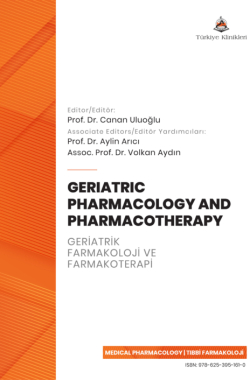Basic Principles of Rational Use of Drug in the Elderly
Ahmet AKICIa , Onur GÜLTEKİNa , Caner VIZDIKLARa
aMarmara University Faculty of Medicine, Department of Medical Pharmacology, İstanbul, Türkiye
Akıcı A, Gültekin O, Vızdıklar C. Basic principles of rational use of drug in the elderly. In: Uluoğlu C, ed. Geriatric Pharmacology and Pharmacotherapy. 1st ed. Ankara: Türkiye Klinikleri; 2023. p.9-14.
ABSTRACT
Age-related physiological alterations and their pathological outcomes increase the impact of drug use in elderly and its rational management. Efforts to amplify rational use of drug (RUD) among elderly have gained momentum worldwide, particularly in countries with large elderly population and aging ones like Türkiye. Reasons such as increased burden of diseases and costs, polypharmacy, adverse effects, administration and posology issues necessitate need for rational management of each step, including discovery, production, prescribing, utilization and disposal of drugs, with a focus on elderly. The drugs are expected to be used in doses meeting individual requirements of this vulnerable population, for an adequate period, and at lowest cost to themselves and community. RUD principles recommend a systematic pharmacotherapy approach, including diagnosing the patient accurately, determining treatment goals, selecting treatment with proven efficacy and safety, prescribing appropriately, initiating pharmacotherapy with clear information and instructions to the patient, monitoring and evaluating results, respectively.
Keywords: Rational use of drug (RUD); elderly; pharmacotherapy; prescribing
Kaynak Göster
Referanslar
- World Health Organization World Report on Ageing and Health. Geneva: 2015.
- WHO Policy Perspectives on Medicines. Promoting rational use of medicines: core components. Geneva: World Health Organization; 2002.
- World Health Organization. The pursuit of responsible use of medicines: sharing and learning from country experiences. Geneva: 2012.
- Akıcı A, Uzuner A. Birinci Basamak Sağlık Kurumlarında Çalışan Hekimlere Yönelik Akılcı İlaç Kullanımı. Akıcı A, editör. 1. Baskı. Ankara: SGK Yayın No:111; 2013. p.26-93.
- Holloway K, Dijk VL. Rational use of medicines. In: The world medicines situation 2011. 3rd ed. Geneva: World Health Organization; 2011.
- World Health Assembly. Progress in the rational use of medicines. Geneva: World Health Organization; 2007.
- Akıcı A. Akılcı ilaç kullanımı. 1. Baskı. Ankara: T.C. Sağlık Bakanlığı Sağlık Araştırmaları Genel Müdürlüğü Yayını; 2013. p.31-74; 155-62.
- Toklu HZ, Ayanoğlu Dülger G. Rational drug use and the role of the pharmacist. Marmara Pharm J. 2011;15(3):89-93. [Crossref]
- Toklu HZ. Rational Use of Medicine in Pharmacy Practice. Turkiye Klinikleri J Pharmacol-Special Topics. 2015;3(1):74-83.
- Sakarya S. The Role of Users in Rational Drug Use. Turkiye Klinikleri J Pharmacol-Special Topics. 2015;3(1):94-8.
- De Vries TPGM, Henning RH, Hogerzeil HV, Fresle DA. Guide to Good Prescribing. WHO Action Programme on Essential Drugs. Geneva: World Health Organization; 1994.
- Gelal A. Rational Drug Use in Elderly. Türkiye Klinikleri J Pharmacol-Special Topics. 2015;3(1):57-64.
- Akıcı A. General Principles of Rational Use of Medicine and Current Situation in Turkey. Turkiye Klinikleri J Fam Med-Special Topics. 2015;3(1):1-10.
- Akıcı A, Gelal A. Rational Use of Nonsteroidal Antiiflammatory Drugs at Primary Health Care Center. Turkiye Klinikleri J Fam Med-Special Topics. 2011;2(2):61-70.
- The 2023 American Geriatrics Society Beers Criteria® Update Expert Panel. American Geriatrics Society 2023 updated AGS Beers Criteria® for potentially inappropriate medication use in older adults. J Am Geriatr Soc. 2023;71(7):2052-81. [Crossref] [PubMed]
- Gallagher P, O'Mahony D. STOPP (Screening Tool of Older Persons' potentially inappropriate Prescriptions): application to acutely ill elderly patients and comparison with Beers' criteria. Age Ageing. 2008;37(6):673-9. [Crossref] [PubMed]
- Hill-Taylor B, Sketris I, Hayden J, Byrne S, O'Sullivan D, Christie R. Application of the STOPP/START criteria: a systematic review of the prevalence of potentially inappropriate prescribing in older adults, and evidence of clinical, humanistic and economic impact. J Clin Pharm Ther. 2013;38(5):360-72. [Crossref] [PubMed]
- Hamilton H, Gallagher P, Ryan C, Byrne S, O'Mahony D. Potentially inappropriate medications defined by STOPP criteria and the risk of adverse drug events in older hospitalized patients. Arch Intern Med. 2011;171(11):1013-9. [Crossref] [PubMed]
- Bahat G, İlhan B, Erdoğan T, Halil M, Savas S, Ulger Z, et al. Turkish inappropriate medication use in the elderly (TIME) criteria to improve prescribing in older adults: TIME-to-STOP/TIME-to-START. Eur Geriatr Med. 2020;11(3):491-8. [Crossref] [PubMed] [PMC]

